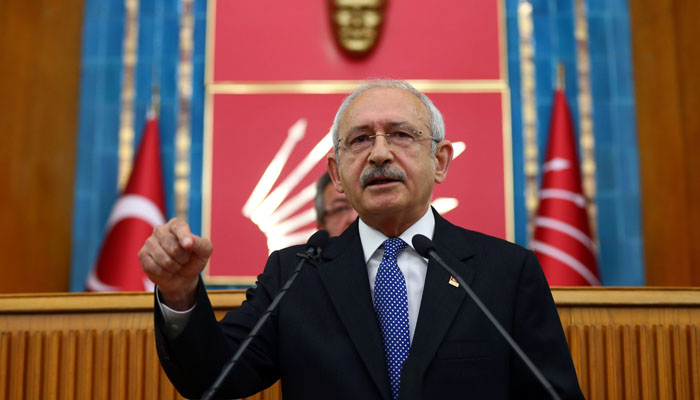Main opposition Republican People’s Party (CHP) leader Kemal Kılıçdaroğlu has chastised the European Court of Human Rights (ECtHR), which referred submissions concerning post-coup public worker purges in Turkey to a commission ostensibly set up to deal with such complaints.
Speaking during the CHP group meeting on Tuesday, Kılıçdaroğlu said: “Don’t you know what’s going on in Turkey? Which justice are you talking about? Justice that is late is no justice at all. The judiciary in Turkey is openly acting as a hitman for the government. The ECtHR should not fall into the same situation. If it does, it will lose its respectability. [They are saying] we will have a look after it is reviewed by the commission. Which commission? The judiciary does not function during coup periods. What is happening today is much worse than what happened during the Sept. 12 coup period — collective purges… the law of the jungle.”
A ruling by the ECtHR on Monday turned down an application by a fired Turkish teacher on the grounds that he had not yet exhausted all domestic remedies. The ruling was criticized by Andrew Gardner, Amnesty International’s researcher on Turkey, in a Twitter message: “ECHR’s faith in TR’s commission defies both experience+logic. Is insult to 100K arbitrarily dismissed workers. Re-assessment must come soon.”
The European court referred to a commission that was announced by the Turkish government to review situations of state workers who have been dismissed by government decrees following a failed coup attempt on July 15, 2016, as a means of solution for Gökhan Köksal, a Turkish primary school teacher who had submitted a petition for the court to hear his case.
“The ECtHR ruling on dismissed people is shameful. It does not respond to any claims about the [lack of ability] of the commission,” said human rights lawyer and associate professor Kerem Altıparmak in a tweet.
“That legislation provided for the setting-up of a commission with the task, in particular, of adjudicating upon appeals against measures adopted directly by legislative decrees issued in the context of the state of emergency, including the dismissals of civil servants. The decisions taken by the commission could then be appealed against before the administrative courts, whose decisions in turn could be challenged before the Constitutional Court by individual petition,” said the European court in its decision.
Following an application to the Constitutional Court and a ruling by that court, anyone could, if necessary, file with the ECtHR a complaint based on the European Convention on Human Rights, added the court.
Köksal, who was a teacher at the 1071 Malazgirt Primary School in the eastern province of Erzurum, was expelled from his post along with 50,000 other civil servants by a government decree issued on Sept. 1, 2016.
The expelled civil servants were regarded as belonging to, affiliated with or related to terrorist organizations or to organizations, structures or groups that had been found by the National Security Council (MGK) to engage in activities harmful to the state.
Köksal lodged the application with the ECtHR on Nov. 4, 2016.
Relying on Article 6 of the European Convention on Human Rights, Köksal complained of a violation of his right of access to a court, his right to be presumed innocent and his right to be informed promptly of the accusation against him. Relying on Article 7 (no punishment without law), he complained that he had been dismissed on the basis of acts that did not constitute an offense at the time they were committed.
Köksal also argued that he sustained breaches of his rights and freedoms under Articles 8 (right to respect for private and family life), 10 (freedom of expression), 11 (freedom of assembly and association), 13 (right to an effective remedy) and 14 (prohibition of discrimination).
In its decision, which was made public on Monday, the ECtHR unanimously declared Köksal’s application inadmissible on the grounds that he did not exhaust domestic remedies, finding that Köksal had to use the remedy provided for under legislative decree no. 685.


